136 scholarly books by Dartmouth College Press and 9
have author last names that start with C
136 scholarly books by Dartmouth College Press and 9
136 scholarly books by Dartmouth College Press
9 have author last names that start with C have author last names that start with C
9 have author last names that start with C have author last names that start with C
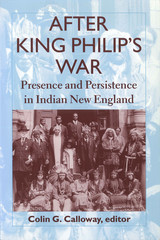
After King Philip’s War
Presence and Persistence in Indian New England
Colin G. Calloway
Dartmouth College Press, 1997
The 1676 killing of Metacomet, the tribal leader dubbed "King Philip" by colonists, is commonly seen as a watershed event, marking the end of a bloody war, dissolution of Indian society in New England, and even the disappearance of Native peoples from the region. This collection challenges that assumption, showing that Indians adapted and survived, existing quietly on the fringes of Yankee society, less visible than before but nonetheless retaining a distinct identity and heritage. While confinement on tiny reservations, subjection to increasing state regulation, enforced abandonment of traditional dress and means of support, and racist policies did cause dramatic changes, Natives nonetheless managed to maintain their Indianness through customs, kinship, and community.
[more]
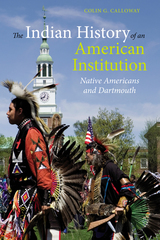
The Indian History of an American Institution
Native Americans and Dartmouth
Colin G. Calloway
Dartmouth College Press, 2010
Dartmouth College began life as an Indian school, a pretense that has since been abandoned. Still, the institution has a unique, if complicated, relationship with Native Americans and their history. Beginning with Samson Occom’s role as the first “development officer” of the college, Colin G. Calloway tells the entire, complex story of Dartmouth’s historical and ongoing relationship with Native Americans. Calloway recounts the struggles and achievements of Indian attendees and the history of Dartmouth alumni’s involvements with American Indian affairs. He also covers more recent developments, such as the mascot controversies, the emergence of an active Native American student organization, and the partial fulfillment of a promise deferred. This is a fascinating picture of an elite American institution and its troubled relationship— at times compassionate, at times conflicted—with Indians and Native American culture.
[more]
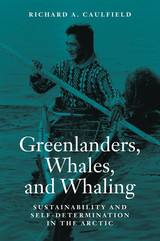
Greenlanders, Whales, and Whaling
Sustainability and Self-Determination in the Arctic
Richard A. Caulfield
Dartmouth College Press, 2000
Whaling has been central to the life of Greenland's Inuit peoples for at least 4000 years, but political, economic, technological, and regulatory changes have altered this ancient practice. Richard A. Caulfield reveals these impacts first by analyzing Home Rule and its success in Greenland, and then by looking at whaling's place in the contemporary Greenlandic economy and its evolving co-management regime. What emerges from his investigation is an intricate web connecting traditions of indigenous peoples, the promises and pitfalls of co-management, the influence of international whaling policies, the complexities of sustainability, and the power of culturally determined views shaping relationships between humans and their environment. Caulfield finds that controversy over whaling often arises from conflicting idea systems, rather than disagreement over biological resource management. Understanding the ways Greenlanders and outside interests have defined and negotiated these conflicts "gives us more than just an insight into how indigenous peoples are coping with a changing world," he writes. "It also provides us with a sense of the challenges we face as well."
[more]
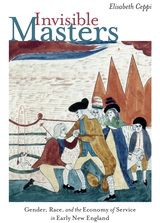
Invisible Masters
Gender, Race, and the Economy of Service in Early New England
Elisabeth Ceppi
Dartmouth College Press, 2018
Invisible Masters rewrites the familiar narrative of the relation between Puritan religious culture and New England’s economic culture as a history of the primary discourse that connected them: service. The understanding early Puritans had of themselves as God’s servants and earthly masters was shaped by their immersion in an Atlantic culture of service and the worldly pressures and opportunities generated by New England’s particular place in it. Concepts of spiritual service and mastery determined Puritan views of the men, women, and children who were servants and slaves in that world. So, too, did these concepts shape the experience of family, labor, law, and economy for those men, women, and children—the very bedrock of their lives. This strikingly original look at Puritan culture will appeal to a wide range of Americanists and historians.
[more]
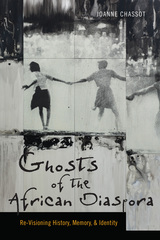
Ghosts of the African Diaspora
Re-Visioning History, Memory, and Identity
Joanne Chassot
Dartmouth College Press, 2018
The first monograph to investigate the poetics and politics of haunting in African diaspora literature, Ghosts of the African Diaspora: Re-Visioning History, Memory, and Identity examines literary works by five contemporary writers—Fred D’Aguiar, Gloria Naylor, Paule Marshall, Michelle Cliff, and Toni Morrison. Joanne Chassot argues that reading these texts through the lens of the ghost does cultural, theoretical, and political work crucial to the writers’ engagement with issues of identity, memory, and history. Drawing on memory and trauma studies, postcolonial studies, and queer theory, this truly interdisciplinary volume makes an important contribution to the fast-growing field of spectrality studies.
[more]
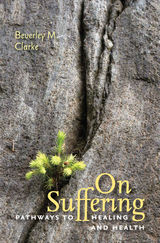
On Suffering
Pathways to Healing and Health
Beverley M. Clarke
Dartmouth College Press, 2011
Currently in medicine, theories of pain regard pain and suffering as one and the same. It is assumed that if pain ceases, suffering stops. These theories are not substantiated in clinical practice, where some patients report little pain and extreme suffering and other individuals have a lot of pain and virtually no suffering. Based on the results of a scientific questionnaire, as well as evidence from and conversations with hundreds of patients, Beverley M. Clarke argues convincingly that suffering is often separate from pain, has universal measurable characteristics, and requires suffering-specific treatments that are sensitive to the patient’s individual psychology and cultural background. According to Clarke, suffering occurs when individuals who have experienced a life change because of medical issues perceive a threat to their idea of self and personhood. This kind of suffering, based on a lost “dream of self,” affects every aspect of an individual’s life. Treating the patient as a whole person—an approach that Clarke strongly advocates—is an issue overlooked in the majority of chronic care and traumatic injury treatments, focused as they are on pain reduction. Clarke believes passionately that the management of suffering in medicine is the responsibility of all health care practitioners. Until they come to identify and understand suffering as distinct from pain, the entire health care system will continue to carry the financial and moral burden of incomplete diagnoses, inappropriate referrals for care, ineffective treatment interventions, and lost human potential.
[more]
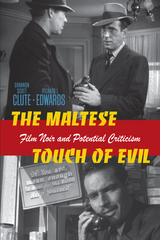
The Maltese Touch of Evil
Film Noir and Potential Criticism
Shannon Scott Clute
Dartmouth College Press, 2011
Noir is among the most popular, acclaimed, and critically assessed film styles of all time. The unfortunate consequence is an ever-growing divergence between fans and scholars with regard to goals and methods for appreciating and studying noir. The Maltese Touch of Evil aims to bridge that gap. Based on a series of popular podcasts, this unique and inspired investigation of film noir sets out to examine the case of noir more closely, and in the process reconfigures the critical evidence on noir that has been presented to date. The Maltese Touch of Evil reproduces and re-sequences nearly 150 still images from 31 great films, laying them out with the authors’ informed and entertaining insights into the significance of each shot. The result is a de facto meta–film noir, a celebration of the genre that shows how these films are themselves “constrained” texts whose carefully calculated visual forms simultaneously generate narrative and critical commentary on that narrative. You will never look at film noir the same way again.
[more]
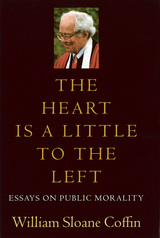
The Heart Is a Little to the Left
Essays on Public Morality
William Sloane Coffin
Dartmouth College Press, 2011
William Sloane Coffin offers here a powerful antidote to the politics of the religious right with a clarion call to passive intellectuals and dispirited liberals to reenter the fray with an unabashedly Christian view of social justice. Refusing to cede the battlefield of morality to conservatives, he argues that “compassion demands confrontation,” as he considers such topics as homophobia, diversity, nuclear weapons, and civil discourse. Coffin became famous while chaplain at Yale in the 1960s for his active opposition to the Vietnam War. Jailed as a civil rights “Freedom Rider,” indicted by the government in the Benjamin Spock conspiracy trial, he attained popular immortality as Reverend Sloan in the Doonesbury comic strip. The seven pieces collected here are peppered with memorable aphorisms and pithy, political one-liners meant to turn bitterness to anger and anger to action.
[more]
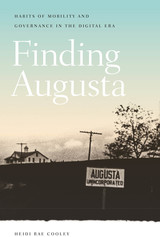
Finding Augusta
Habits of Mobility and Governance in the Digital Era
Heidi Rae Cooley
Dartmouth College Press, 2014
Winner of the 2015 Anne Friedberg Innovative Scholarship Award from the Society for Cinema and Media Studies Finding Augusta breaks new ground, revising how media studies interpret the relationship between our bodies and technology. This is a challenging exploration of how, for both good and ill, the sudden ubiquity of mobile devices, GPS systems, haptic technologies, and other forms of media alter individuals’ experience of their bodies and shape the social collective. The author succeeds in problematizing the most salient fact of contemporary mobile media technologies, namely, that they have become, like highways and plumbing, an infrastructure that regulates habit. Audacious in its originality, Finding Augusta will be of great interest to art and media scholars alike.
[more]
READERS
Browse our collection.
PUBLISHERS
See BiblioVault's publisher services.
STUDENT SERVICES
Files for college accessibility offices.
UChicago Accessibility Resources
home | accessibility | search | about | contact us
BiblioVault ® 2001 - 2024
The University of Chicago Press









